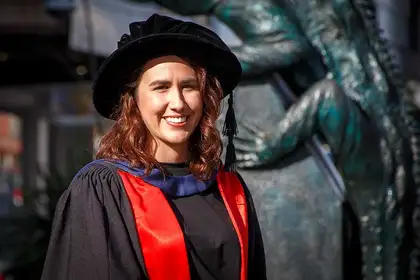
Dr Tamyra Matthews, who explored the dynamics of communicating and receiving news of a cancer diagnosis for her doctoral thesis.
Getting bad news about a cancer diagnosis is inevitably a profound, painful and life-changing experience, although sadly not uncommon. New research from Massey University explores the dynamics of giving and receiving ‘bad news’ – from the way families cope to how hard it is for doctors to deliver the news.
Tamyra Matthews, who graduated with a Doctor of Clinical Psychology last week, undertook her research project after a hui in October 2014 at Raukawa Marae in Otaki, called Ngā whānau i pāngia e te mate pukupuku | Whānau Lives Touched by Cancer.
The purpose of the hui was to hear people’s experiences of the cancer and palliative care services, and key theme that emerged was the challenges inherent in the process of breaking bad news in this context. “In particular, it was identified that family/whānau play a significant role throughout the process of giving bad news, and that this has been under-recognised,” Dr Matthews says.
Her qualitative study in the aftermath of the hui included the experiences of cancer patients, their families/whānau as well as surgeons and nurses involved in oncology care in the MidCentral District Health Board region.
Among her key findings, she concludes that in the process of breaking bad news to patients with cancer there are “no two situations alike”, that relationship building between patient, family and healthcare services is critical, and that it is both a challenge for all, as well as a shared responsibility.
Dr Matthews says there is existing evidence that “the quality of how bad news is delivered has an impact on those receiving the news, such as influencing psychosocial adjustment, coping, healthcare outcomes, satisfaction with care, level of uncertainty, and anxiety and depression.”
And while health professionals these days are more likely to receive some training in empathetic communication with patients, some told her they wanted to do better but were hampered by time constraints, workload and a lack of resources and support.
“When talking about delivering bad news to patients about cancer, healthcare professionals spoke about this being a very challenging part of their job, and that the process could have an emotional impact on them,” Dr Matthews writes.
“Despite this, surgeons knew that giving bad news was always going to be part of their job and were committed to doing the best that they could, being very aware of the impact this news had on patients and whānau.”
Participating in the research was a way surgeons and nurses could offer their perspective on how the process of delivering bad news could be improved. Many surgeons had not been given any formal training or instruction as to the best way to do this, she explains. “Instead, learning how to do it was mostly through years of experience. Surgeons said that experience had taught them that they needed to find ways of coping with this difficult part of their work, so they could keep performing this role.”
It never gets easier
A big part of delivering bad news for surgeons was showing care towards their patients. This sometimes was in the form of taking extra time in the consultation, changing how the news was said based in the needs of the individual patient, and providing hope.
Like patients and whānau, surgeons spoke about the importance of forming a relationship with their patients, taking time to get to know their patients and their interests, and staying alongside the patient as they moved through their treatment if possible, as well as encouraging family to come along to support the patient when news was given and to ask questions.
“All the surgeons mentioned that there were factors that limited their ability to give bad news in the way they would ideally like to. These included having limited time (needing to see lots of patients in one day) and not having a quiet, private space to tell patients bad news,” Dr Matthews says.
The nurses she interviewed recognised that the process “never got easier” no matter how long they had worked in the field. “As with surgeons, nurses spoke about needing to find ways to cope with their own emotional reactions to this part of the work, which included debriefing with colleagues and knowing when they needed to take a break. As with surgeons, caring for themselves helped them to keep caring for their patients.”
Dr Matthews, whose family moved to New Zealand from South Africa when she was a child, has gained qualifications at Massey’s School of Psychology at master’s and now doctoral level. She is an avid champion of the role of Health Psychology in helping individuals, communities and society better understand health.
While cancer is a physical condition, how people cope with it hinges on strong relationships, she adds. Bringing a culturally attuned lens to a clinical issue is another way that Health Psychology can provide insights and recommendations to improve patient experiences and outcomes, she says.
Dr Matthews is currently working in the Capital and Coast District Health Board’s specialist Māori Mental Health Service in Porirua. She hopes her research, which was supervised by Dr Don Baken and Dr Kirsty Ross, will address gaps in international knowledge in this area, particularly in Aotearoa’s bicultural context and where nearly 30 per cent of all deaths are due to cancer.
(Note: All the patients in the study had had successful cancer treatment at the time they were interviewed).